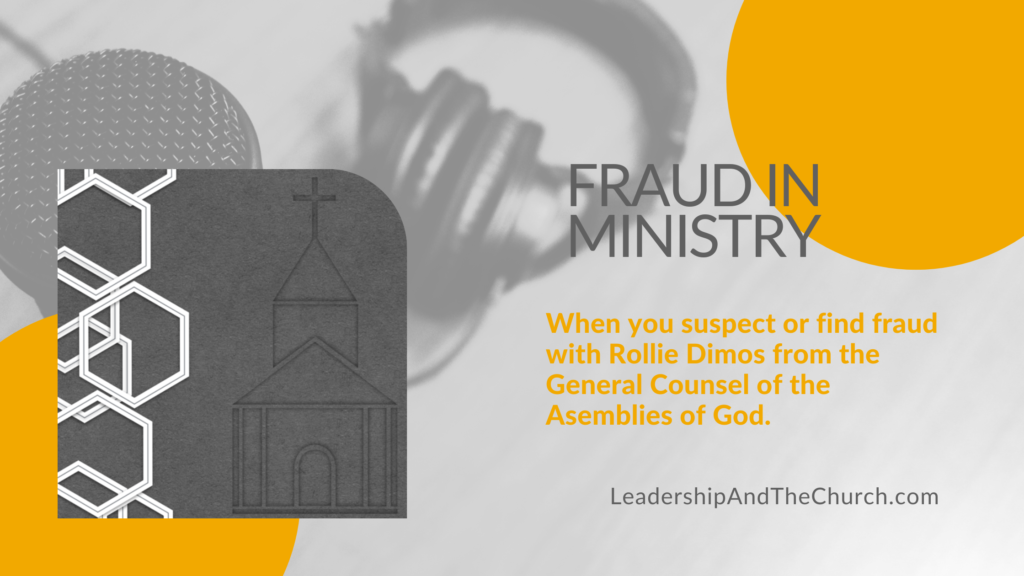Chris Miller, President of Miller Management, is the host of this week’s episode. He is joined by his colleague, Rollie Dimos, Internal Auditor at the General Counsel at the Assemblies of God.

This month, we will be discussing why fraud is an issue, share some examples, and detail ways to prevent fraud and what to do if you suspect fraud in your ministry. This series is not just for the financial people in church, Pastors and other leaders in the church need to hear about steps you can take, too.
Finding Fraud
When you suspect and then find fraud, you go through the seven stages of grief. And then have to decide if you are going to procecute. Some churches decide on forgiveness with restitution. Some go total forgiveness. And still others have to prosecute.
For one church, that meant they drafted a legal document and once restitution was made and they held up their end of the deal, a place at the church was found for them. Note, this is not the norm. Sometimes things don’t end nicely, and often the frauster will deny the fraud.
Outside Qualified Expert
If there is a suspected fraudster in your ministry, we recommend getting someone who is qualified to handle these situations before confronting the individual. Preferrably an outside unbiased party is best.
According to the ACFE’s Report to the Nation, 42% of churches don’t prosecute, while 52% do. The mean amount held accountable is $200,00 for criminal and $300,00 for civil cases. Those that don’t prosecute are in the $50,000- $70,000 range. Once insurance gets involved, you may be forced to prosecute. Which is one reason insurance doesn’t always get involved in these cases.
Reason to Report
In the episode where several cases were laid out, there were a few that spanned multiple churches. This is definitely a point to the side of consequenses. Whatever the consequence, it needs to be something that leaves a mark. You don’t want to pass along your problem to some other unsuspecting church.
Think of how hurt you were by the indiviual, now imagine the church before you knew about the suspicious activity and didn’t say anything. That hurts, too. Don’t be that guy.
Come up with a goal early in the process, to know how best to move forward. This is another reason to have those difficult conversations ahead of time. Put internal control in place ahead of time. And create a culture of questions ahead of time.
“It’s not about retribution, but about accountability.”
– Chris Miller
This series is not meant as legal advice in any way, if you suspect fraud in your ministry, reach out to a qualified expert in the field. Miller Management can help provide some assistance with our Certified Fraud Examiners, give us a call at 816-382-3050 or visit our website, GoodFaithAccounting.com.
Resources
The two books mentioned in this episode were Confessions of a Church Felon, co-authored by Miller Management’s CEO and Integrity at Stake, by our podcast guest Rollie Dimos.
Coming Up
Join us next week as we begin a new series: Generosity and the Church.
Join the conversation, see behind the scenes, and learn more on our Instagram and X pages.
Special thanks to our guest, Rollie Dimos, and our masters of all things Podcasting, Chris and Lauren Miller, for this final episode in our Fraud in Ministry series.
